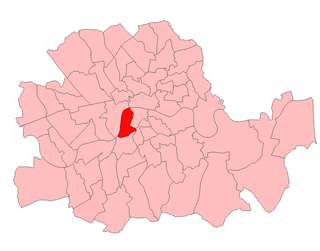This page is based on this
Wikipedia article Text is available under the
CC BY-SA 4.0 license; additional terms may apply.
Images, videos and audio are available under their respective licenses.

The Lord President of the Council is the fourth of the Great Officers of State of the United Kingdom, ranking below the Lord High Treasurer but above the Lord Privy Seal. The Lord President usually attends and is responsible for presiding over meetings of the Privy Council, presenting business for the monarch's approval. In the modern era, the holder is by convention always a member of one of the Houses of Parliament, and the office is normally a Cabinet post.

Frederick North, 2nd Earl of Guilford,, better known by his courtesy title Lord North, which he used from 1752 to 1790 was Prime Minister of Great Britain from 1770 to 1782. He led Great Britain through most of the American War of Independence. He also held a number of other cabinet posts, including Home Secretary and Chancellor of the Exchequer.

Sheffield Hallam is a constituency represented in the House of Commons of the UK Parliament since 2017 by Jared O'Mara.
Fred, Frederic, or Frederick Smith may refer to:
Robert Lindsay may refer to:

Lieutenant-Colonel Lord Edward Cavendish MP was a 19th-century British politician, soldier, and nobleman.
Frederick Thomas Willey was a British Labour Party politician.
William Waldegrave may refer to:

Richard Frederick Wood, Baron Holderness, was a British Conservative politician who held numerous ministerial positions from 1955 to 1974. He was distinctive in having lost both his legs in action in North Africa during World War II.
Events from the year 1871 in Ireland.
Frederick Hamilton may refer to:
The 1902 Liverpool East Toxteth by-election was held on 6 November 1902 after the resignation of the Conservative MP Augustus Frederick Warr. The seat was retained by the Conservative candidate Austin Taylor.
The Kingston-upon-Thames by-election of 1937 was held on 1 July 1937. The by-election was held due to the elevation to the peerage of the incumbent Conservative MP, Frederick Penny. It was won by the Conservative candidate Percy Royds.

The Lambeth North by-election of 1934 was held on 23 October 1934. The by-election was held due to the death of the incumbent Liberal MP, Frank Briant. It was won by the Labour candidate George Strauss who had previously been the MP for Lambeth North but lost it to Briant in the landslide defeat for Labour in 1931.
The North Lancashire by-election of 1878 was held on 8 April 1878. The by-election in the North Lancashire constituency was fought due to the incumbent Conservative MP, Frederick Stanley, becoming secretary of State for War and in the normal practice of the time, he vacated the seat in his appointment to the Cabinet, to be returned unopposed.
The 1902 Birthday Honours were announced on 10 November 1902, to celebrate the birthday of Edward VII the previous day. The list included appointments to various orders and honours of the United Kingdom and the British Empire.
The New Year Honours 1892 were appointments by Queen Victoria to various orders and honours of the United Kingdom and British India.
The 1902 Coronation Honours were announced on 26 June 1902, the date originally set for the coronation of King Edward VII. The coronation was postponed because the King had been taken ill two days before, but he ordered that the honours list should be published on that day anyway.
The 1945 New Year Honours were appointments by many of the Commonwealth realms of King George VI to various orders and honours to reward and highlight good works by citizens of those countries. They were announced on 1 January 1945 for the British Empire, Canada, and the Union of South Africa to celebrate the past year and mark the beginning of 1945.
The 1892 Birthday Honours were appointments by Queen Victoria to various orders and honours to reward and highlight good works by citizens of the British Empire. The appointments were made to celebrate the official birthday of The Queen, and were published in the London Gazette on 24 May 1892 and in The Times on 25 May 1892.







